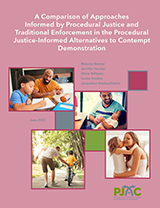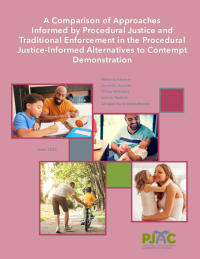A Comparison of Approaches Informed by Procedural Justice and Traditional Enforcement in the Procedural Justice-Informed Alternatives to Contempt Demonstration

 When a child does not live with both parents, the parent with whom the child does not live is known as the “noncustodial parent.” The noncustodial parent may be responsible for a share of the costs associated with raising the child. Parents who do not make their child support payments can be subject to enforcement measures such as license suspensions or interceptions of tax refunds. If these measures do not yield sufficient payment, child support programs can refer parents to the legal system for civil contempt of court. Civil contempt proceedings require noncustodial parents to attend hearings and may lead to arrest or jailing.
When a child does not live with both parents, the parent with whom the child does not live is known as the “noncustodial parent.” The noncustodial parent may be responsible for a share of the costs associated with raising the child. Parents who do not make their child support payments can be subject to enforcement measures such as license suspensions or interceptions of tax refunds. If these measures do not yield sufficient payment, child support programs can refer parents to the legal system for civil contempt of court. Civil contempt proceedings require noncustodial parents to attend hearings and may lead to arrest or jailing.
In recent years, some child support policymakers and researchers have questioned the fairness and effectiveness of pursuing civil contempt to secure child support payments, particularly for parents with low incomes. Civil contempt proceedings are costly, burdensome, and often counterproductive to the goals of the child support program. They can impede employment, increase child support debt, alienate noncustodial parents from their children, and decrease parents’ cooperation with the program.
The Procedural Justice-Informed Alternatives to Contempt (PJAC) demonstration project tested a different approach to improving child support payments. Developed by the Office of Child Support Enforcement, it integrated principles of procedural justice (the idea of fairness in processes) into enforcement practices in six child support agencies across the United States as an alternative to standard contempt proceedings. PJAC services aimed to address noncustodial parents’ reasons for nonpayment, improve the consistency of their payments, and promote their positive engagement with the child support program and the other parent.
The PJAC demonstration used a random assignment research design. Parents who had reached the point of a contempt referral were assigned either to a PJAC services group, which had access to child support services informed by procedural justice, delivered by a specially trained PJAC case manager, or to the business-as-usual group, which proceeded to the standard contempt process. This report compares the service and enforcement experiences of parents in these two groups. Findings include:
- PJAC case managers conducted in-depth case reviews, outreach and engagement with both parents, and case-planning activities to address underlying reasons for nonpayment and connect parents to support and services. The principles of procedural justice underpinned this intensive casework. Though some elements of the PJAC model were present in business-as-usual services, they were ad hoc and not applied systematically by regular enforcement workers.
- Compared with business as usual, PJAC services generated modest increases in parents’ receipt of child support services such as order reviews, license reinstatements, and child support debt forgiveness, and a modest reduction in license suspensions, an enforcement action.
- PJAC services led to a nearly 60 percentage point reduction in civil contempt filings, which in turn decreased the proportion of parents in the PJAC services group who experienced ensuing aspects of contempt proceedings.
Taken together, these results suggest a meaningful contrast between the experiences of parents in the PJAC services and business-as-usual groups. This contrast will allow the research team to determine whether PJAC services achieved the intervention’s goal of improving payment outcomes. Those findings will be the subject of a future report.






